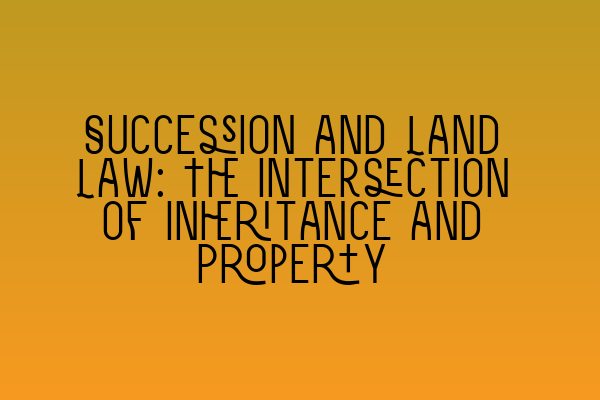Succession and Land Law: The Intersection of Inheritance and Property
When it comes to the transfer of property rights after the death of a property owner, succession law and land law intersect. This intersection is crucial in determining how property is transferred, who inherits it, and how the inheritance process unfolds. In this blog post, we will delve into the intricate relationship between succession law and land law, exploring the key concepts and considerations involved.
Understanding Succession Law
Succession law, also known as inheritance law, deals with the transfer of property, rights, and obligations from one individual to another after their death. It encompasses various aspects, including wills, intestacy, and testamentary dispositions. When a person passes away, their property is distributed according to the laws of succession.
In England and Wales, the rules of intestacy come into play when someone dies without a valid will. These rules determine who inherits the deceased’s estate based on their relationship with the deceased. Typically, spouses, children, and other close relatives are given priority in the distribution of the estate.
It is important to understand the rules of intestacy and how they apply in different scenarios. Our related article on SQE 1 Practice Exam Questions can provide further guidance on this topic.
The Impact of Succession Law on Land Law
Land law governs the ownership, use, and transfer of land and the rights associated with it. A key consideration within land law is determining who has the legal right to possess and benefit from a particular property. Succession law plays a significant role in this determination.
When a property owner dies, their ownership rights need to be transferred to the appropriate inheritor or beneficiary. This process often involves probate, which is the official proving of a will and the granting of authority to administer the estate. The probate process ensures that the transfer of land ownership is legally valid and recognized.
It is essential to navigate the complexities of probate correctly to avoid potential disputes or complications in transferring land ownership. Our related article on SQE 1 Practice Mocks FLK1 FLK2 offers valuable insights and practice exams to enhance your understanding of probate and its implications.
Considerations in Succession and Land Law
When dealing with succession and land law, several considerations need to be taken into account. These include:
- Types of Property: Different types of property come with different legal implications and inheritance rules. Freehold properties, leasehold properties, and jointly-owned properties each have their own unique considerations when it comes to succession. Understanding these distinctions is crucial for a smooth and lawful transfer of ownership.
- Trusts and Wills: Property owners often use trusts and wills to ensure their assets are distributed according to their wishes. Wills provide clear instructions on how the property should be distributed, while trusts can offer added protection and flexibility. Knowledge of the various types of trusts and wills is fundamental in advising clients on their succession planning strategies.
- Taxes and Liabilities: Inheritance tax and other potential liabilities may arise during the succession process. Understanding the tax implications and potential liabilities associated with inherited properties is crucial for both property owners and beneficiaries.
For a comprehensive understanding of these considerations and their practical applications, our related article on SQE 2 Preparation Courses can provide you with invaluable insights and guidance.
Conclusion
The intersection of succession and land law is a critical aspect of property transfers after an individual’s death. Understanding the legal principles, processes, and considerations involved is crucial for solicitors and legal professionals practicing in property law. By navigating the complexities of succession and land law, you can efficiently guide clients through the inheritance process and ensure a smooth transfer of property rights.
For more information on preparing for the SQE exams, exploring SQE 1 and 2 preparation courses, and staying up to date with the latest SRA exam dates, please visit our related articles on SQE 1 Preparation Courses and SRA SQE Exam Dates.
